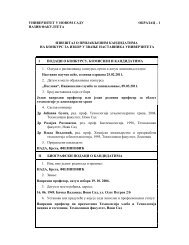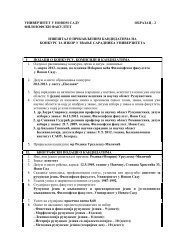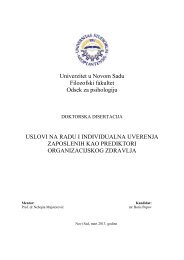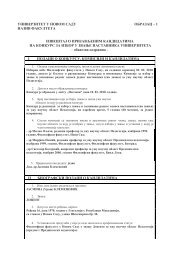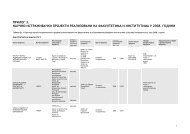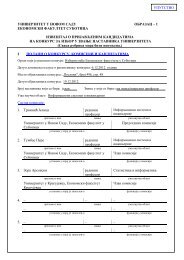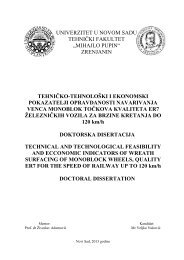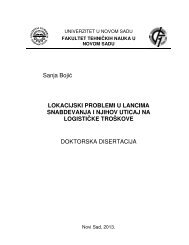Intercultural competence as an aspect of the communicative ...
Intercultural competence as an aspect of the communicative ...
Intercultural competence as an aspect of the communicative ...
You also want an ePaper? Increase the reach of your titles
YUMPU automatically turns print PDFs into web optimized ePapers that Google loves.
(Hammer et al. 2003:425). In spite <strong>of</strong> toler<strong>an</strong>ce <strong>of</strong> people at this stage, <strong>the</strong>y ‘are unable to<br />
appreciate o<strong>the</strong>r cultures because <strong>the</strong>y c<strong>an</strong>not see <strong>the</strong>ir own culture clearly’ (Bennett<br />
2004: 67).<br />
The research done with this model <strong>an</strong>d <strong>the</strong> instrument that <strong>as</strong>sesses <strong>the</strong><br />
intercultural experience shows that this stage is a tr<strong>an</strong>sition between <strong>the</strong> ethnocentric <strong>an</strong>d<br />
ethnorelative stages. Still, this stage belongs to <strong>the</strong> ethnocentric side, since one’s own<br />
culture is seen <strong>as</strong> central, behaviours <strong>of</strong> o<strong>the</strong>r cultures tend to be explained by <strong>the</strong> frame<br />
<strong>of</strong> one’s culture, because <strong>the</strong>re is not ‘cultural self-awareness’ (Bennett 2004). As a<br />
consequence, ICC learners should be taught to perceive that <strong>the</strong>ir beliefs <strong>an</strong>d values are<br />
influenced by <strong>the</strong> context <strong>an</strong>d, <strong>the</strong>refore, one needs to be able to perceive alternatives to<br />
that context.<br />
In <strong>the</strong> stage <strong>of</strong> Accept<strong>an</strong>ce learners recognize <strong>the</strong> possibility <strong>of</strong> different cultural<br />
norms with one’s culture seen just <strong>as</strong> one <strong>of</strong> m<strong>an</strong>y. Culture-general categories are created<br />
in order to show a r<strong>an</strong>ge <strong>of</strong> relev<strong>an</strong>t cultural contr<strong>as</strong>ts among cultures. Bennett calls this<br />
‘cultural self-awareness’ (Bennett 1993: 50). Bennett (2004) points out that cultural<br />
knowledge about a particular culture is not <strong>of</strong> <strong>an</strong>y value for this stage, purporting that<br />
‘people need to have a “critical m<strong>as</strong>s”’ (Bennett 2004: 69)<strong>of</strong> information about <strong>an</strong>o<strong>the</strong>r<br />
culture in order to apprehend <strong>the</strong> worldview, <strong>an</strong>d that even that amount <strong>of</strong> information is<br />
useless unless b<strong>as</strong>ic minimization issues have been resolved. Also, individuals at this<br />
stage might fall pray to political correctness, trying to show a liking <strong>of</strong> <strong>an</strong>o<strong>the</strong>r culture,<br />
since <strong>the</strong>y should not think that IC sensitivity <strong>an</strong>d <strong>competence</strong> are connected to agreeing<br />
with o<strong>the</strong>rs’ values <strong>as</strong> uncritical agreement is a characteristic <strong>of</strong> <strong>an</strong> ethnocentric view<br />
(Bennett 2004).<br />
An import<strong>an</strong>t issue when progressing though <strong>the</strong> stages is to be able to see value<br />
relativity across cultures, that is, being able to see how different values differently<br />
org<strong>an</strong>ize experience while being able to ‘maintain ethical commitment’ (Bennett 2004:<br />
69).<br />
At <strong>the</strong> stage <strong>of</strong> Adaptation individuals know enough about <strong>an</strong>o<strong>the</strong>r culture to be<br />
able to shift a frame <strong>of</strong> reference <strong>an</strong>d modify behaviour to fit its norms, be able to engage<br />
in empathy <strong>an</strong>d from this stage progress into biculturality or multiculturality. People at<br />
this stage c<strong>an</strong> show empathy, <strong>an</strong>d are able to make a whole ‘shift’ in all three domains –<br />
cognitive, affective <strong>an</strong>d behavioural. Individuals c<strong>an</strong> underst<strong>an</strong>d o<strong>the</strong>r cultures <strong>an</strong>d adapt<br />
<strong>the</strong>ir behaviours <strong>an</strong>d feelings according to a particular situation.<br />
78



